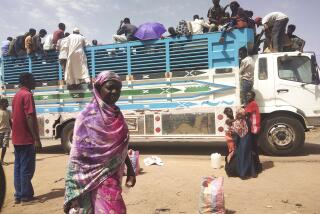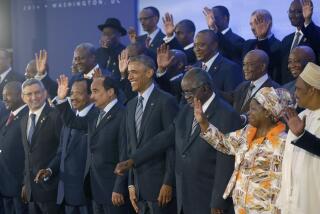U.S. to Announce New Aid Programs for South Africa : Diplomacy: Officials are to outline plans for housing, education and electrification help during President Nelson Mandela’s visit.
- Share via
WASHINGTON — U.S. officials are expected to announce a series of programs today to further economic development in South Africa, a nation they hope will become a model for its continent.
During a four-day visit by President Nelson Mandela, officials here will outline U.S. programs for housing, education and electrification in the newly democratic South Africa. Also planned is a bilateral commission aimed at developing technology and industry. And the United States will lend its assistance with an economic-development conference early next year.
The officials were putting final touches on these programs as Mandela arrived Tuesday at the White House in his first visit since April’s landmark elections.
Greeted by President Clinton and a jubilant crowd of 4,000 on the South Lawn, Mandela made clear that he wanted even more from the United States, a country that he said had already played a key role in South Africa’s transition.
Just as Americans helped bring about the new South Africa, Mandela said, U.S. business can play a role “in ensuring that there are enough homes, there are enough jobs, there are enough schools, there are enough hospitals and doctors for our country.”
“I come here . . . knowing I will not go back with empty hands,” Mandela said. “Come and invest in our country.”
“We will walk every mile with you, and . . . we will not grow weary on the way,” Clinton rejoined.
The United States has committed to provide $600 million in aid over three years for South Africa, of which one-third already has been delivered. The programs expected to be announced today will rely on those funds and about $10 million in new money.
U.S. officials believe that the future stability of South Africa rests on the ability of the government to at least partially meet the rising expectations of the impoverished majority. Unemployment is still 40% in South Africa, and about half of the population is illiterate.
“The huge issue here is to make democracy relevant in the lives of the people of South Africa,” a senior U.S. official said. “The test of democracy is not only that you are free, but . . . that this makes a practical difference in their lives.”
The bilateral commission is to be modeled on a commission set up between the United States and Russia last year. That panel has overseen negotiations on a joint space station and promoted other ventures, as well as assisted in Russia’s de-nuclearization.
The United States also has begun to work with the South Africans on fighting drug trafficking--an effort kicked off by a recent visit to South Africa by White House drug czar Lee P. Brown. And U.S. military officials will increase ties and training with the South African military, officials said.
Other U.S. economic development aid will come through the Overseas Private Investment Corp., which supports private American investment in developing countries by providing them with insurance, financing and information services.
Clinton and Mandela held a brief meeting at the White House on Tuesday afternoon before Mandela headed to a State Department lunch with corporate executives, diplomats and social activists.
The South African president was a guest at a White House state dinner Tuesday evening with about 200 other guests and entertainment provided by singer Whitney Houston. White House officials said demand for invitations was “huge.”
“People were pulling every string they could find,” one source said.
More to Read
Sign up for Essential California
The most important California stories and recommendations in your inbox every morning.
You may occasionally receive promotional content from the Los Angeles Times.











